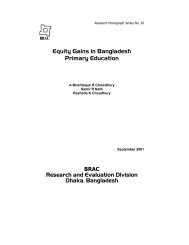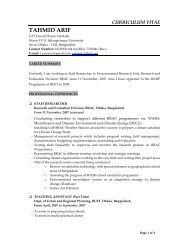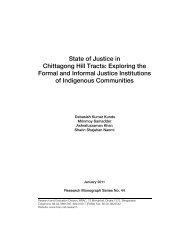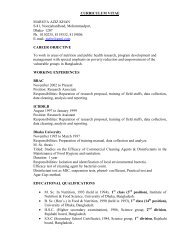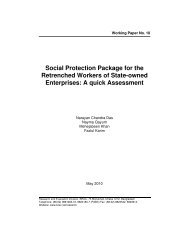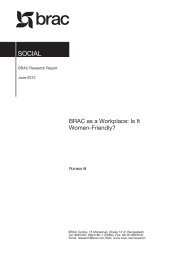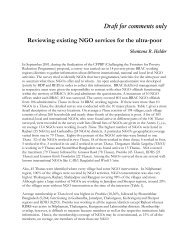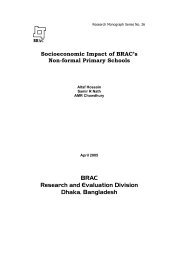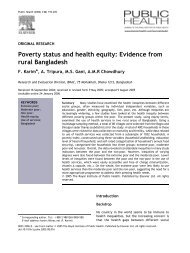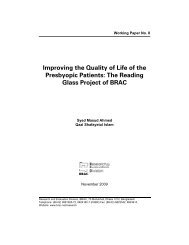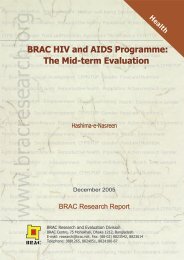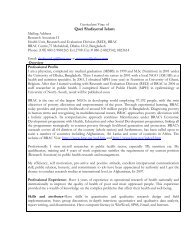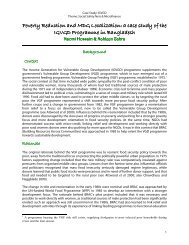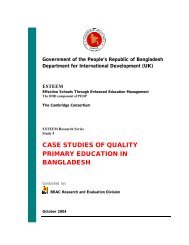Combining health and social protection measures to reach the ultra ...
Combining health and social protection measures to reach the ultra ...
Combining health and social protection measures to reach the ultra ...
You also want an ePaper? Increase the reach of your titles
YUMPU automatically turns print PDFs into web optimized ePapers that Google loves.
Access <strong>to</strong> <strong>health</strong><br />
threatening <strong>and</strong> serious conditions <strong>to</strong> be registered on <strong>the</strong><br />
ClinicalTrials.gov databank, detailed analyses indicate that a<br />
significant number of industry-sponsors do not comply with<br />
<strong>the</strong> requirement 41 .<br />
To support WHO’s initiative, funding agencies, academic<br />
centres, philanthropic organizations, <strong>and</strong> supportive industrial<br />
sponsors ought <strong>to</strong> develop strict compliance mechanisms.<br />
Registration should be imposed as a requirement for research<br />
ethics approval. Patient advocacy groups could attach<br />
registration as a condition <strong>to</strong> support <strong>and</strong> advertise clinical<br />
trials. The best approach would be for domestic governments<br />
with control over existing primary registries <strong>to</strong> endow relevant<br />
governing bodies with <strong>the</strong> necessary legal jurisdiction <strong>to</strong> enforce<br />
compliance through sanctions. Given industry’s concern about<br />
competitive advantage, it seems particularly important <strong>to</strong><br />
assure pharmaceutical companies that <strong>the</strong>re is a level playing<br />
field, by ensuring compliance with registration requirements.<br />
Domestic regulations <strong>and</strong> state control can do that.<br />
Even though <strong>the</strong> WHO minimal data set extends well<br />
beyond information required <strong>to</strong> be registered in several o<strong>the</strong>r<br />
registries, some have criticized <strong>the</strong> WHO initiative for providing<br />
insufficient information. The Ottawa Statement, for example,<br />
proposes that registration data fur<strong>the</strong>r include information on<br />
<strong>the</strong> full pro<strong>to</strong>col <strong>and</strong> consent forms, details of ethics committee<br />
approval <strong>and</strong> o<strong>the</strong>r trial design information 42 .<br />
Registration of <strong>the</strong> WHO data set will indeed not resolve all<br />
problems associated with manipulation of trial results 43 . It is<br />
unclear how <strong>the</strong> accuracy of registration data that are not peerreviewed<br />
as well as <strong>the</strong> scientific validity of statistical analyses<br />
<strong>and</strong> interpretations could be validated using information from<br />
existing registries or resources. The registration system does<br />
not alleviate concerns associated with <strong>the</strong> fact that sponsors<br />
with vested commercial interests still control how research is<br />
designed, how subjects are recruited, how data are collected,<br />
<strong>and</strong> how results are presented 44 . The data set does not provide<br />
registry staff or researchers with access <strong>to</strong> pro<strong>to</strong>cols or raw<br />
data, which significantly hampers independent scientific<br />
review of database entries. Without <strong>the</strong> ability <strong>to</strong><br />
independently review <strong>and</strong> validate entries, selective reporting<br />
of trial results may still occur. Finally, <strong>the</strong> basic principles of<br />
evidence-based medicine require review of study design <strong>and</strong><br />
quality in addition <strong>to</strong> o<strong>the</strong>r relevant scientific data prior <strong>to</strong><br />
drawing conclusions from a single study 45 .<br />
Finally, WHO’s clinical trials registration system does not<br />
impose results reporting. It allows <strong>the</strong> public, researchers, <strong>and</strong><br />
governmental agencies <strong>to</strong> know that research is or has been<br />
undertaken, which allows for fur<strong>the</strong>r scrutiny <strong>and</strong> questions<br />
when publications come out. But it does not provide <strong>the</strong>m<br />
with direct access <strong>to</strong> final outcomes. Several influential<br />
organizations have called for public disclosure of results in a<br />
manner analogous <strong>to</strong> clinical trial registration, including <strong>the</strong><br />
US Institute of Medicine, ICMJE, <strong>and</strong> researchers 46 . As noted<br />
by <strong>the</strong> ICMJE in <strong>the</strong>ir most recent discussion statement on<br />
m<strong>and</strong>a<strong>to</strong>ry registration 47 , <strong>the</strong> climate for results registration will<br />
likely change dramatically <strong>and</strong> unpredictably over coming<br />
years but is sure <strong>to</strong> go ahead in some form.<br />
WHO has recognized that this is a next important step in <strong>the</strong><br />
promotion of research integrity. It has set up a Study Group on<br />
<strong>the</strong> Reporting of Findings of Clinical Trials, which is looking at<br />
<strong>the</strong> development of criteria <strong>and</strong> st<strong>and</strong>ards of disclosure of<br />
results 48 . This new initiative will constitute ano<strong>the</strong>r important<br />
step <strong>to</strong>wards more reliable <strong>and</strong> trustworthy clinical research.<br />
Result reporting will only have success, however, if a coherent,<br />
comprehensive, <strong>and</strong> m<strong>and</strong>a<strong>to</strong>ry registration system is in place.<br />
It seems <strong>the</strong>refore crucial that national governments,<br />
professional organizations, industry, <strong>and</strong> researchers commit<br />
<strong>to</strong> such a registration system <strong>and</strong> fully support WHO in its<br />
efforts. ❏<br />
Trudo Lemmens is an associate professor at <strong>the</strong> Faculties of Law<br />
<strong>and</strong> Medicine of <strong>the</strong> University of Toron<strong>to</strong>. His research currently<br />
focuses on how law <strong>and</strong> regulation contribute <strong>to</strong> <strong>the</strong> promotion of<br />
ethical st<strong>and</strong>ards in <strong>the</strong> context of medical research <strong>and</strong><br />
biotechnological innovations. Recent publications include <strong>the</strong> coedited<br />
volume Law <strong>and</strong> Ethics in Biomedical Research: Regulation,<br />
Conflict of Interest, <strong>and</strong> Liability <strong>and</strong> <strong>the</strong> co-authored book Reading<br />
<strong>the</strong> future? Legal <strong>and</strong> Ethical Challenges of Predictive Genetic<br />
Testing. In <strong>the</strong> last four years, Trudo Lemmens has been a member<br />
of <strong>the</strong> Institute for Advanced Studies in Prince<strong>to</strong>n, a visiting<br />
professor at <strong>the</strong> KU Leuven <strong>and</strong> <strong>the</strong> University of Otago, <strong>and</strong> a<br />
Fellow of <strong>the</strong> Royal Flemish Academy of Belgium for Science <strong>and</strong><br />
<strong>the</strong> Arts. Since 2006, he has been a member of <strong>the</strong> PAHO Advisory<br />
Committee on Health Research.<br />
Ron A Bouchard is a doc<strong>to</strong>ral c<strong>and</strong>idate in law <strong>and</strong> runs his own<br />
consulting firm. His career has focused on <strong>the</strong> science, law <strong>and</strong><br />
policy of pharmaceuticals <strong>and</strong> biotechnology as well as strategic<br />
planning for commercialization of innovative technologies. He<br />
began his career as a scientist, obtaining a doc<strong>to</strong>rate <strong>and</strong> working<br />
in <strong>the</strong> field of membrane electrophysiology. He shifted focus <strong>to</strong> law,<br />
<strong>and</strong> has been involved in <strong>the</strong> prosecution, acquisition, financing,<br />
distribution, <strong>and</strong> litigation of intellectual property rights relating <strong>to</strong><br />
pharmaceuticals <strong>and</strong> biotechnology. He has appeared before <strong>the</strong><br />
Federal Court of Canada on trial <strong>and</strong> appeal matters <strong>and</strong> <strong>the</strong><br />
Supreme Court of Canada. He currently conducts research on drug<br />
regulation <strong>and</strong> innovation from <strong>the</strong> perspective of systems dynamics<br />
<strong>and</strong> complex adaptive systems.<br />
Acknowledgements<br />
Research for this chapter was funded by Genome Canada through<br />
<strong>the</strong> Ontario Genomics Institute, by Génome Québec, <strong>the</strong> Ministère du<br />
Développement Économique et Régional et de la Recherche du<br />
Québec <strong>and</strong> <strong>the</strong> Ontario Cancer Research Network, as part of <strong>the</strong><br />
ARCTIC project. Ron Bouchard also received support from <strong>the</strong> CIHR<br />
Health Law & Policy Program <strong>and</strong> <strong>the</strong> Lupina Foundation<br />
Comparative Program in Health <strong>and</strong> Society at <strong>the</strong> Munk Centre for<br />
International Studies. The authors thank Michelle Jackson for work on<br />
<strong>the</strong> references.<br />
Global Forum Update on Research for Health Volume 4 ✜ 043



